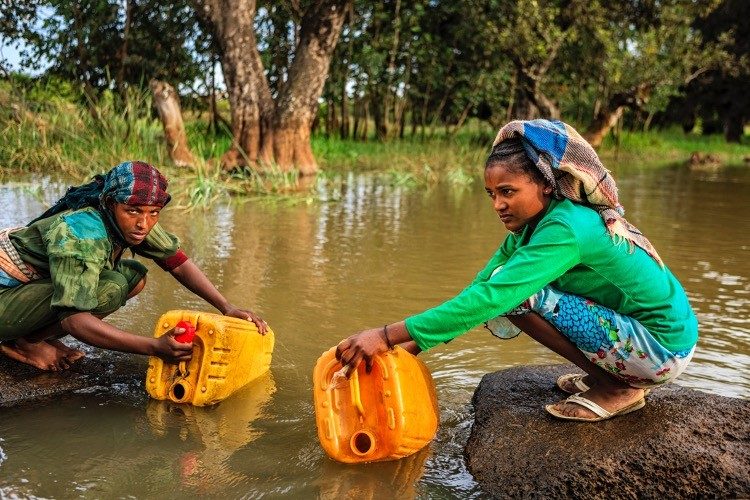
Every living thing requires energy to function. Without energy there is no movement. Without energy there is no life.
There is also, of course, no economic activity. Thus is the West’s war on energy most tragic — especially for Africans, who are being crippled by it.
So warn two experts, Joel Kotkin, director of the Urban Reform Institute; and South African engineer Hügo Krüger. Writing at UnHerd on Monday, they point out that unlike the West’s 1970s energy crisis, the current one is a self-inflicted wound, the result of government imposition of a greentopian agenda.
The authors state that while the pseudo-elites love the energy “reset,” it destroys the poor and working class. They allude to the rolling California brownouts and mention that 10 percent of homes in Spain have insufficient winter heat, that Italians’ electricity bills increased 55 percent by January 2022, and that the number of British residences unable to meet their energy costs is predicted to triple by April.
Yet greentopianism’s effects are even more devastating in the Third World. As Kotkin and Krüger (K&K) write:
Already in 2015, for example, the president of the African Developmental Bank stated that “Africa cannot function because we have no power” and affirmed the continent’s need for “renewable and conventional” energy, including “natural gas and coal”.
Similarly, in the lead-up to the UN Climate Change Conference last year, Nigerian President Muhammadu Buhari warned that the climate policies favoured by Western governments[,] investors and aid agencies could lead to an Africa-wide energy crisis. Just last month, the president of Senegal made it clear ahead of the EU-African Union summit that Africans are not prepared to pay for Europe’s carbon levy. South Africa’s Energy Minister, meanwhile, criticised NGOs and universities that promote “climate-driven solutions” with money from European think tanks.
And African leaders have every reason to be concerned about the dangers of expensive energy. Fuel riots have occurred in the recent past in Senegal, Malawi, South Africa, and Nigeria, while energy costs were a catalyst for the Arab Spring, when a spike in oil prices drove up the price of grain. Earlier this year in Kazakhstan, soaring energy prices nearly sparked a revolution.
Given that more than half of all Africans live in energy poverty, perhaps their politicians have every right to be worried.
But the greentopians have a strategy for combating this resistance: bribery and the stick. Not only can Western aid be made contingent upon embracing woke policies, but pseudo-elites also plan on handing “over their taxpayers’ wealth to Third World governments, which get bonus points for denying their subjects access to resources,” wrote The New American in 2016.
And, of course, Third World officials are often quite willing to keep their people poor if it’s a condition for a pay-off.
K&K also mention how the man-caused climate change lie has animated the “de-growth” movement. The greentopians are viscerally passionate about it, too. In fact, they tipped their hand in early 2021 when the World Economic Forum (WEF) posted a bizarre but revealing tweet, with an embedded video (below), and proclaimed that COVID “lockdowns are quietly improving cities around the world.”
The video’s tone is striking, with the WEF clearly ebullient over the lockdowns. Unsurprisingly, the organization later deleted its tweet, realizing it had exposed itself.
(Note: This WEF mask-drop misstep reflected the common phenomenon whereby people, having become inured to the outrageous, will sometimes forget themselves and reveal shades of their sickness to those not similarly desensitized. It’s as with a deviant who shocks others by making a comment revealing his perversion because to him it has come to seem like normality.)
Killing the Earth in Gaia’s Name
The kicker is that the greentopian, anti-energy, de-growth scheme would likely exacerbate environmental degradation. Why?
Our high-intensity energy sources (e.g., fossil fuels) enable us to mass-produce food, operate water delivery systems, heat homes, run factories, and do everything else that makes modernity — and the supporting of large populations — possible in a sustainable way. This is why, despite our high standard of living, the United States has more forested area now than a century ago and cleaner air and water than in the 1960s.
It’s also why former Greenpeace figure Patrick Moore warned in 2019 that if the Green New Deal were instituted globally, it could “result in the death of nearly all humans on Earth.” But before they died their miserable deaths, he pointed out, they’d cut down every tree for fuel and kill every animal for food.
This explains why the freest and richest nations generally have the best environments, as I illustrated in “Why the Greentopians Would Destroy the Earth.” Freedom in the sense of enjoying representative government is necessary because unaccountable leaders will, despite their claims, ravage the environment when convenient, as the Soviet Union, Saddam Hussein’s Iraq, and China today have proven.
Prosperity is a prerequisite for environmental health because as the Chinese proverb informs, “When there’s food on the table, there are many problems; when there’s no food on the table, there’s only one problem.” Like it or not, environmentalism is a passion of those who can afford to care.
By the way, K&K mention that the world’s largest asset manager, BlackRock — an unseen dark hand using your money to force American companies to go woke, as I reported Sunday — is also behind the attack on fossil fuels. Big surprise.
The second kicker here is that while the pseudo-elite greentopians foist their vision on the unwashed masses, they’ve no intention of sacrificing for it themselves. They’ll still have their $150-a-pound Kobe beef, private jets, luxurious yachts, and palatial abodes. Privation is for the little people, you see — starting with the pseudo-elites’ human guinea pigs in Africa.



